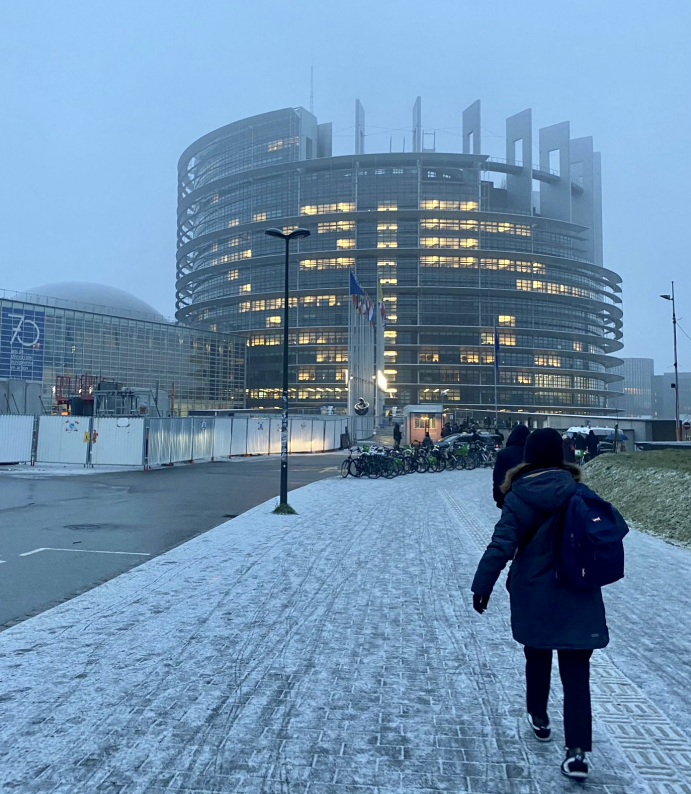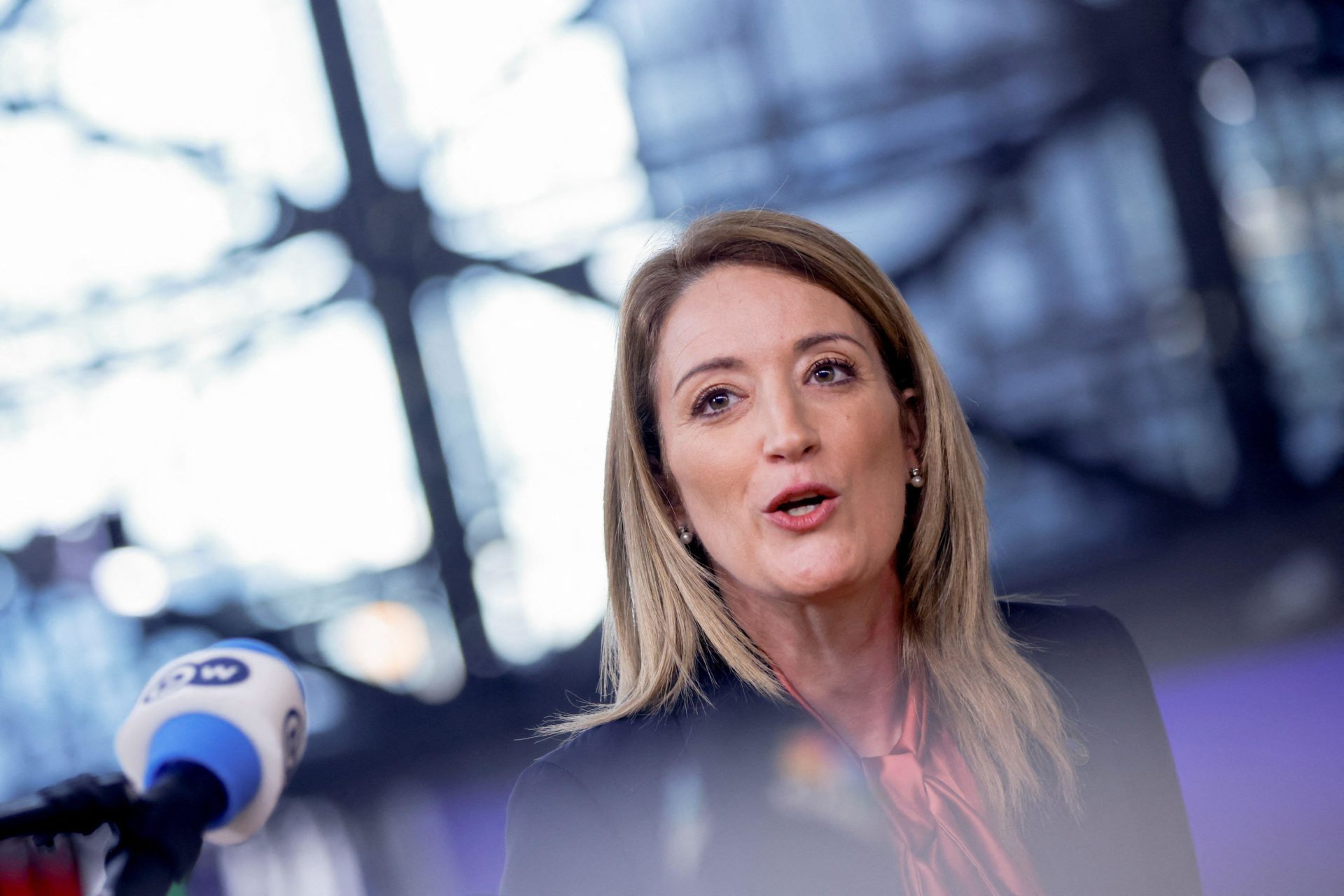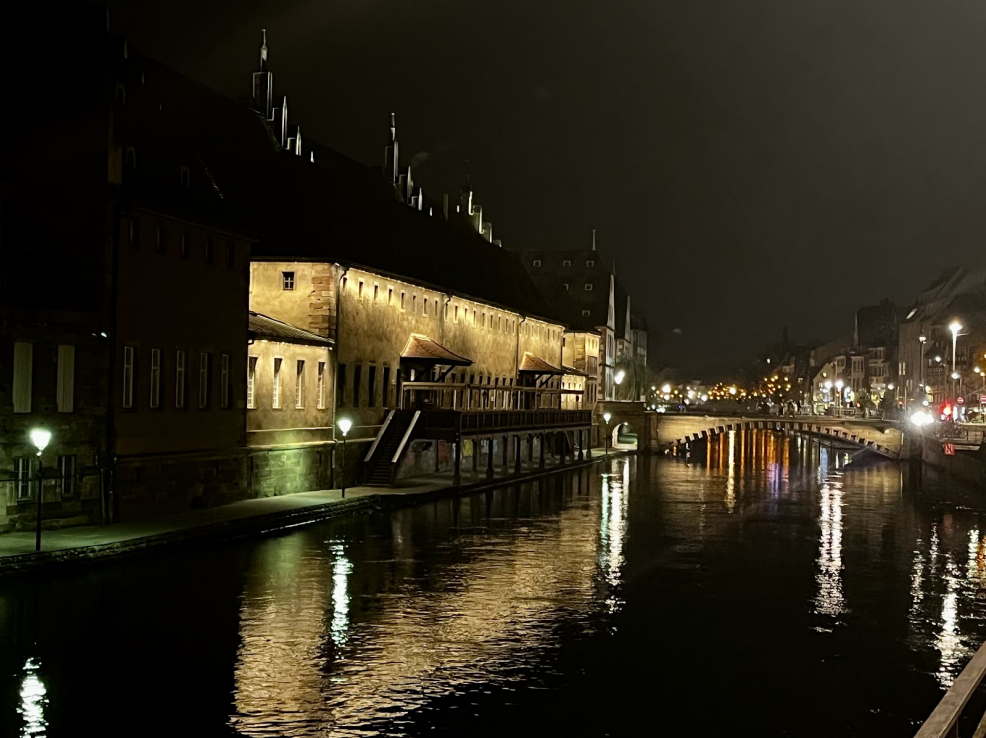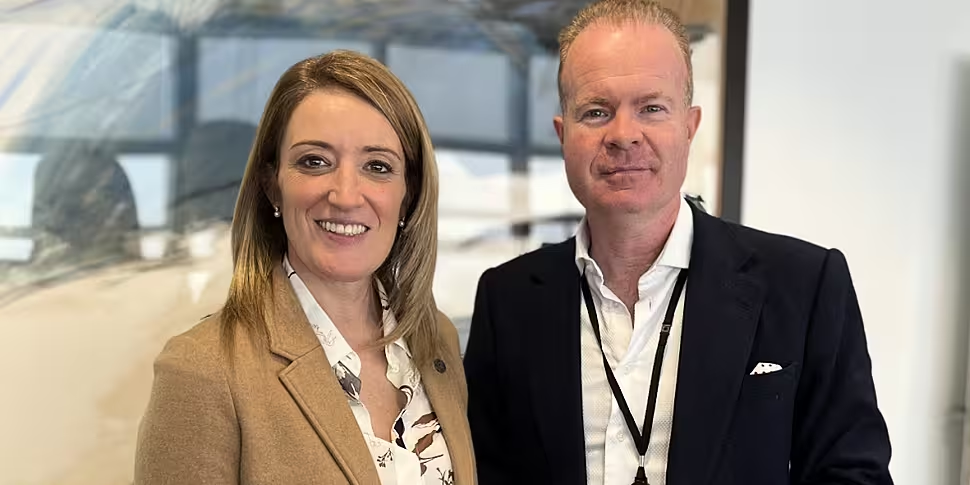It’s been written before but there is no city as beautiful and yet as inaccessible as Strasbourg.
They picked it because the French and Germans had gone to war over it three times and it’s a symbol of the - hopefully - permanent peace between the two neighbours.
France got to keep a place with German names, German architecture and on the German border.
But Berlin and Paris must have been relieved that - so far - none of their nationals have been implicated, arrested, searched or charged with anything to do with ‘Qatargate’.
Instead, it's Athens and Rome who fret as Italian and Greek surnames appear all over this enveloping scandal. Four people linked to those nations have been arrested and some have already been charged by the Belgian authorities.
 The European Parliament building in Strasbourg. Image: Newstalk
The European Parliament building in Strasbourg. Image: NewstalkEva Kaili is in a Brussels prison but has said she broke no rules.
A court service strike has delayed her appearance before a Belgian judge. But her workplace - the European Parliament - has already stripped her of her role as vice president and her political party - Pasok - home to the Papandreou political ascendancy - has fired her.
So the mood last week was as icy as the weather when hundreds of MEPs made their way to the Alsatian capital.
So did I, in a travel odyssey that could feature in any remake of Planes, Trains and Automobiles - without the comedy.
I had pre-booked and confirmed an interview with the president of the EU Parliament Roberta Metsola a week in advance but I was not shocked when she cancelled on Monday night as I was sitting on a bus from Frankfurt to Strasbourg with a bunch of MEPs - scrambling around on mobiles to find any new morsel of information about the institution of which they are the face.
I watched with them Ms Metsola’s incandescent speech (and her first public pronouncement) on the scandal on Monday evening - some of which was confected but most of which was white hot anger that her well-laid legislative plans were set to be benched and overshadowed by the filthy caravan of bribery and graft that had wheeled into town and parked in her driveway.
All other votes and proposals were rendered irrelevant over the next few days.
The brave Ukrainian emergency workers who received the Sakharov peace prize, the latest package of sanctions on Russia – even the looming trade war with the USA over state aid had to step aside as the bright halogen light of MEPs accepting suitcases of cash for diluting any criticism of the oil-rich World Cup hosts blinded all other stories.
 Ireland’s EU Commissioner Mairead McGuinness talks to Breakfast Business live in Strasbourg. Image: Newstalk
Ireland’s EU Commissioner Mairead McGuinness talks to Breakfast Business live in Strasbourg. Image: NewstalkI started and ended the two shows that we broadcast live from the gleaming radio studios within the belly of the Parliament with Qatargate – I didn't want to but I had to.
I spoke to many MEPs and former MEPs including Commissioner Mairead McGuinness about the black brush which was tarring the entire institution.
Then as I queued up for lunch in what is probably the worst laid-out building in Christendom, my phone vibrated with a message from the head of comms of the President. Would I be able to come right now to her office for an interview?
My heart raced. Ms Metsola had eschewed all other planned one-on-one interviews, keeping her powder dry for big speeches before her Plenary peers.
I said I'd gladly do the interview but only on the condition that she answered questions about bribery as well. She agreed and I was brought to the 15th-floor presidential suite overlooking the snow-capped European quarter of Strasbourg, including the ‘talking shop’ of the Council of Europe – now denuded of Russian membership.
 European Parliament President Roberta Metsola speaks to the media as she arrives for a European Union leaders' summit in Brussels, Belgium, 15-12-2022. Image: REUTERS/Johanna Geron
European Parliament President Roberta Metsola speaks to the media as she arrives for a European Union leaders' summit in Brussels, Belgium, 15-12-2022. Image: REUTERS/Johanna GeronRoberta Metsola is a ‘young’ president.
Unlike her three predecessors, she abounds with energy and purpose. Her term is for less than three years and so she needs to make a mark on European legislation in that time.
This graft crisis ensures that she may now become better known than all her predecessors – ironic given she’s from the EU’s smallest member state, Malta.
She arrives in the reception area of her own President Zone at around 2:25pm nibbling on a pretzel – not exactly the lunch of kings or queens, but something to tide her over as she moves, at a fair pace, from meetings to awards ceremonies, to chairing plenary sessions, press conferences and now media interviews. Though she only did one: mine.
She speaks in French to the formally dressed and silver-chain-wearing custodians of the parliament, English to her staff, Italian and Maltese in her home country and she probably has picked up Finnish from her husband.
 Strasbourg by night. Image: Joe Lynam/Newstalk
Strasbourg by night. Image: Joe Lynam/NewstalkI start our interview by asking how she’ll vote on the amendment to suspend the open skies agreement signed last year between the EU and Qatar – an agreement which appears to benefit only one airline: Qatar Airways.
Then I raise the fact that MEPs can hire whoever they want and no one gets sanctioned if they don't declare meetings with lobbyists etc.
She remains unflustered as you will hear and remains chatty and engaging afterwards.
Even though I was told I'd get only eight minutes, I was still in her company 26 minutes after the first handshake.
Pleasantries aside, she will have some job reforming an institution which has resisted reform and true transparency for decades. A kind of Orange Order with better offices.
She’ll be under pressure to do so from the two other major EU institutions: the Commission and the Council. That’s because the latter two, although not directly affected by this brewing scandal, know that they too will be tarred with its putrid graft-imbued brush.
If Ms Metsola can't clean up her own house, the garbage will spill out all over the neighbourhood.
You can listen to the full interview here:









